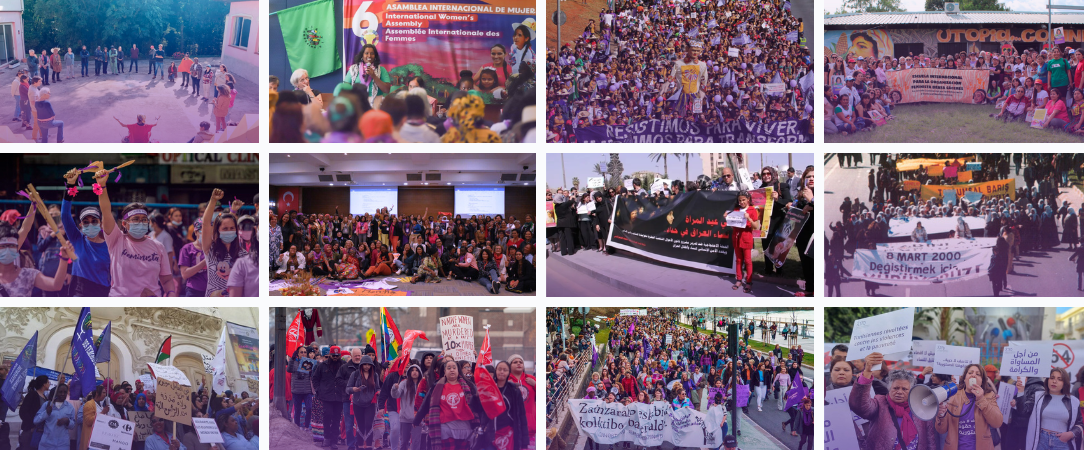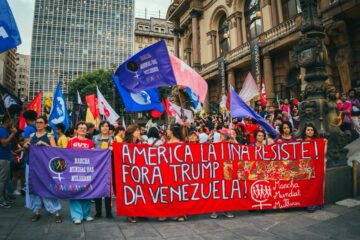We close the year 2023 with a year-in-review piece full of struggles and solidarity, collective ideas and reflections coming from the experiences of women from around the world. It has been a year when defending life, freedom, and the self-determination of the peoples was urgent, as well as fighting imperialism and its wars, sanctions, embargoes, and the criminalization of fighters. We have come together again in feminist internationalism building spaces. We said goodbye to sisters who have been fundamental to our struggle; we created collective forms of memory and kept on building grassroots feminism.
At Capire, we have amplified the voices of militant women with 19 interviews, 25 authored pieces of writing, and 31 accounts of experiences, plus video and audio content. We have published exclusive content and also partnered with other counter-hegemonic media outlets and grassroots movements. We have striven so that our platform could facilitate conversations, alliances, and exchanges that have furthered the global understanding of grassroots feminism and the urgency of anti-systemic transformation. As our sister Nalu Faria would always tell us, the answers to the problems of the peoples don’t have to be invented by theories, because they are already being done by the peoples themselves. It is up to grassroots feminist communications to record them, share them, and promote a conversation between them, thus strengthening movement building, the feminist political subject, and the concrete practices of internationalism.
Urgent Solidarity: We Will Keep On Marching Until Palestine Is Free!
Defending a free Palestine from the river to the sea against the Zionist occupation and the ongoing genocide is a fundamental struggle for anti-imperialist women. We have joined grassroots media and answered to Leila Khaled’s call: “I am calling the media. You. You are also people who struggle. You, that can be also strong enough to have a message for the world.”
Over the course of 2023, we have expanded the struggle for the Palestinian people, denouncing the ongoing genocide in Gaza and publicizing the struggle waged by Palestinian women to defend their lives, their bodies, and their land with interviews and analyses that provide us with an overview on the power of this resistance. We read the writer Maryam Abu Daqqa’s account about the persecution Palestinian women endure in their land and abroad; the WMW militant Abeer Abu Khdeir denounced the ongoing genocide when the conflict was starting to escalate; from Leila Khaled, we learned about the legitimacy of the Palestinian resistance against the Zionist occupation and the need for concrete action from each of our countries in defense of the Palestinian people; and Yasmeen El-Hasan addressed the profound, deep-rooted relationship of the Palestinian people with their own land, affirming the struggle for land as a key element of the defense of a free Palestine. The pieces published by Capire are tools to strengthen this struggle, which will go through a crucial phase in 2024: it is urgent to put an end to the attacks from Israel, the genocide, and the Zionist occupation.
An Anti-Imperialist and Anti-Colonial Feminism
Marking 200 years of Monroe Doctrine, we published a denunciation by the WMW and ALBA Movements about the past and present of US imperialism in the Americas, and we expressed feminist solidarity through the campaign “Let Cuba Live!”.
Strengthening feminist solidarity for the sovereignty and self-determination of Western Sahara, we published an article by Ayla Chejh about the central role women play in the political organization of Western Sahara, and launched the video A Flag in the Sand, produced by Capire and the WMW International Secretariat, which shows the everyday life of women in Sahrawi refugee camps in Algeria.
Reunions and International Coverage
We have been closely following the International Feminist Organizing School (IFOS) since 2021. In August this year, more than 100 women from across the Americas met in Honduras to conduct a regional—the first on-site—edition of the School, involving a group of movements and organizations that work in alliance in the region. Capire published reflections about decolonizing bodies and sexualities, the importance of the mística in feminist education, and the building of a plural feminist subject—knowledge that was accumulated through discussions held at the School. We also published an excerpt from the book “Decolonial Feminist Popular Education.”
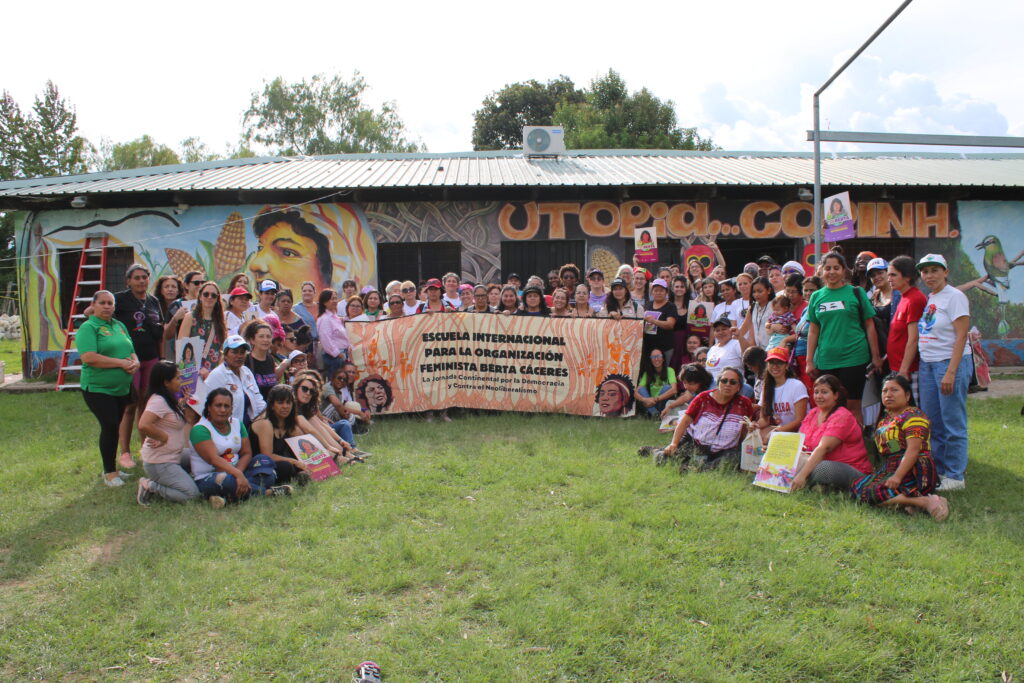
In October this year, the World March of Women held its 13th International Meeting, its first on-site meeting after the pandemic. It took place in Ankara, Turkey, with representatives from national coordinating boards of the March and ally movements from 65 countries. As part of the preparations for the Meeting, we published writings about feminist economy as a political tool of the World March of Women and also about experiences over the course of the movement’s history, like the creation of the Solidarity Quilt in 2005 and the closing event of the 3rd International Action in the Democratic Republic of Congo in 2010.
Our coverage of the 13th International Meeting included the publication of an article and a video piece. We also published interviews with the Indian feminist Sehjo Singh and the Palestinian activist Abeer Abu Khdeir.
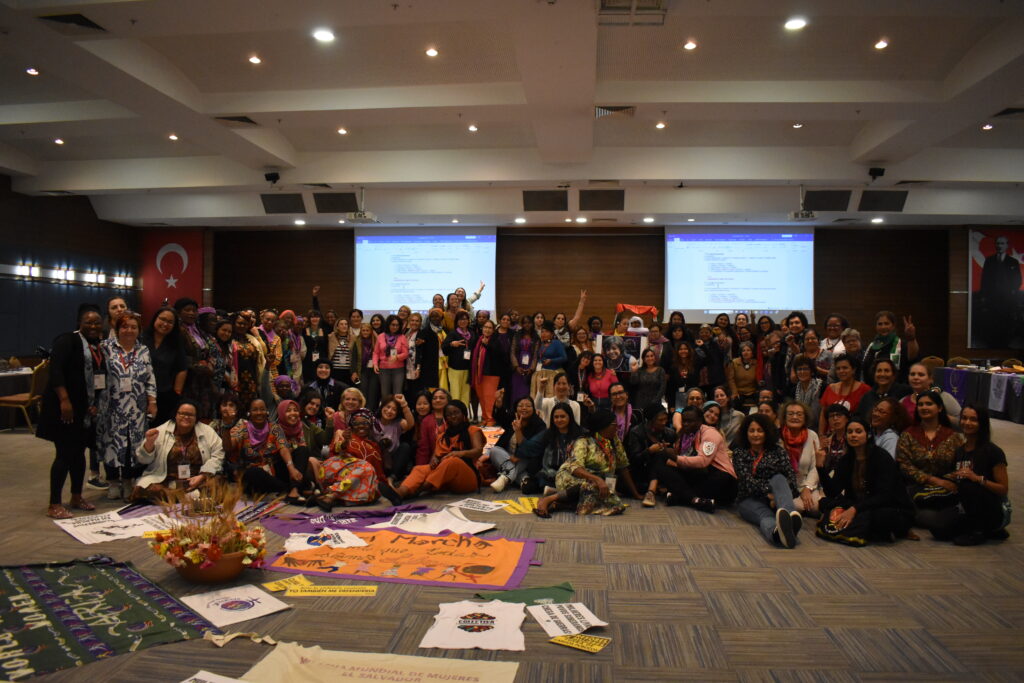
In September and October, we took part in the 3rd Dilemmas of Humanity Conference of the International Peoples’ Assembly (IPA) in its regional (Santiago, Chile) and international (Johannesburg, South Africa) stages. Regionally, we introduced our experience with grassroots communications and published an edited version of the speech by the Ecuadorian sociologist Irene León. At the international stage, we engaged in conversations with women participants and wrote about the accumulated knowledge from the anti-patriarchal and anti-capitalist struggles in building socialism. We also published the speech by Ana Priscila Alves (Brazil) and interviews with the militants Leila Khaled (Palestine), Theodora Pius (Tanzania), and Phakamile Hlubi-Mjola (South Africa).
Capire took part in the comms convergence at the 8th La Via Campesina Conference in December this year in Bogota, Colombia. During the conference, the 6th Women’s Assembly of La Via Campesina was held, a moment for the organization of popular and peasant feminism. We published a reflection by leaders of CLOC-La Via Campesina about the history and accumulated knowledge of peasant women in building food sovereignty, and also an analysis by Geum-Soon Yoon, from South Korea, about the challenges of the current scenario. During the conference, we interviewed several La Via Campesina leaders, including the Nepalese militant Daya Laxmi, who is also a member of the WMW International Committee.
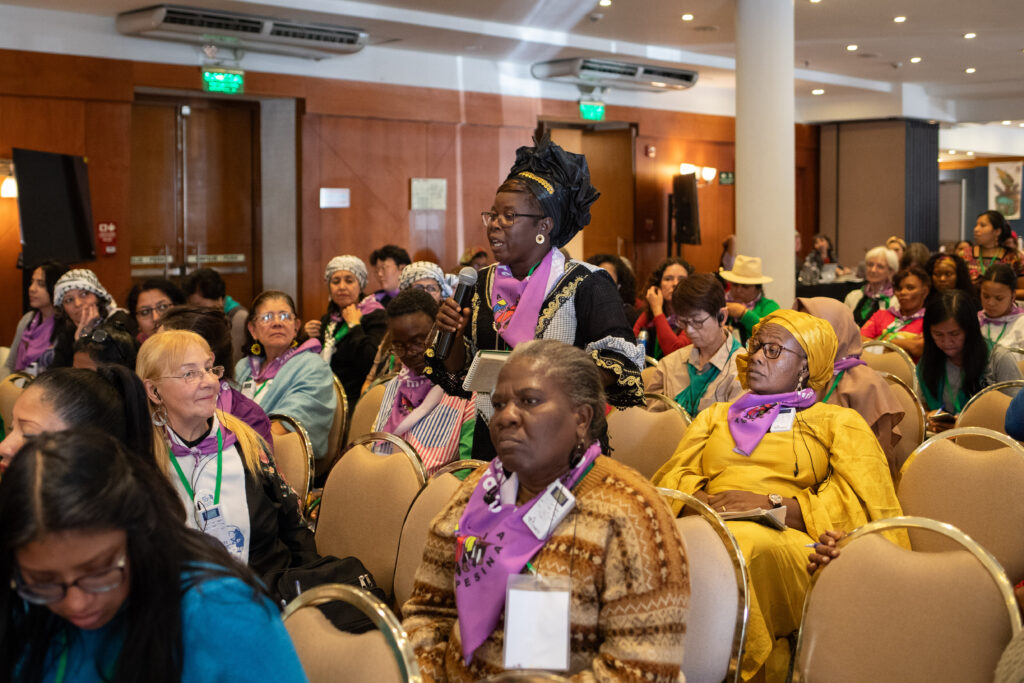
Feminist Memory
In 2023, we said goodbye to feminist militants who made history and dedicated their lives to the struggle resisting patriarchal capitalism and defending equality and autonomy in their countries and the world. The legacy of Nalu Faria, Ahlam Belhaj, Cleone Santos, Sarah Spatz, and Maria Mies will continue to exist through the flame of feminist revolution that drives us. We have built and will continue to build memory from their struggles, and so we remember other sisters of the history of feminism. We looked back on the history and contributions of Miriam Makeba and Josie Mpama from South Africa, the Cuban revolutionaries Haydée Santamaría and Vilma Espín, the Guyanese militant Andaiye, the Honduran Berta Cáceres through the words of her daughter Bertita Zúniga, and we reflected about what we want as socialist women reading a 1886 piece by Eleanor Marx. We also recalled 50 years since the military coup in Chile, 10 years since the Rana Plaza collapse, and the history of the May 4th Movement in China.
The year 2023 also marked 25 years of the World March of Women. About this history and our current challenges, we shared an analysis by Yildiz Temürtürkan, the international coordinator of the WMW, and we looked back on the launch of the movement, which took place on March 8th, 2000. We also co-produced a video on the stories of the World March of Women’s struggle for food sovereignty.
Continuous Resistance in Defense of Life and Peoples’ Sovereignty
Around the world, women spearhead struggles in defense of the sustainability of life and peoples’ sovereignty. Women’s resistance denounce war and violence while also creating and keeping territories of peace. In this sense, we interviewed the Egyptian activist Sanaa Seif about the campaign to free her brother and other political prisoners; CODEPINK’s Jodie Evans; Siwatu-Salama Ra and Roxanne Lawson, of the Grassroots Global Justice Alliance (GGJ), about the struggle for demilitarization at the core of imperialism; and Mireya Forel, of Women in Black, about the feminist anti-war agenda.
We published a compelling article about racism and xenophobia around the killing of an Arab teenager by the French police and an analysis on the persecution, kidnapping, and killing Indigenous women endure in the United States. We denounced co-optation and LGBT-phobic violence in rural and urban areas. We also published writings about the political resistance in Peru and Jujuy, Argentina, against police repression and in defense of democracy.
In defense of territories, communities, and nature, we published writings about the resistance against mining in Brazil, the coporate capture of nature on the African continent and at COP15, and oil palm plantations in Chiapas. These are feminist struggles that combine the defense of bodies and territories. From Turkey, Syria, and Kurdish territories, militants wrote about the impacts of the earthquake that hit the region, an unprecedented disaster that saw its impacts worsen due to the neoliberal policy. And to expand the horizons of the ecofeminist struggle, we interviewed Ariel Salleh, which points feminist paths to tackle the ecological collapse of the 21st century.
Women’s bodies are still territories facing a capitalist and patriarchal battle. In the Philippines, Jean Enriquez denounces the prostitution that comes along the military presence in the country and the region. In Iraq, Teeba Saad denounces the personal status laws and systemic masculinity. In Tunisia, women reflect on how labor is becoming increasingly precarious in the informal sector, as well as on the patriarchal control over their bodies.
Formulating and Building Feminist Alternatives
Around the world, through local experiences and collective wisdom-knowledge, women propose economic and social alternatives to change the world. Our content on experiences in media and online platforms includes pieces about Pikara Magazine, in the Spanish state, the Marcha portal from Argentina, the public TV station Telesur from Venezuela, and the platform Maria d’Ajuda from Brazil, which fights violence on the internet.
In Brazil, Rejane Medeiros granted an interview about rural women’s self-organizing efforts in the Brazilian Northeast. These self-organizing efforts were also strong in the Margaridas’ March, when more than 100,000 women came together in the Brazilian capital, and in the feature film Ant Nest: Women’s Everyday Revolution, which covered WMW actions across the country. In the Philippines, women resist authoritarianism while also taking forward the struggle for land reform. In the Basque Country, women organize a campaign demanding feminist care policies. In Georgia and the Dominican Republic, as well as internationally through La Via Campesina and the World Rainforest Movement (WRM), women promote political education processes and look back on the history of feminist struggle in their countries. In France, women struggled against the pension reform, providing a feminist critique of the pension system. In the Americas, women bring together feminism and integration between the peoples and get ready for a continental day for integration.
In all of these examples, centering the political struggle around the sustainability of life is part of the strategy of the political subjects from each place. Feminist economy, with its disruptive perspective of radical transformation of the social organization, has become an important beacon for the struggles to come. 2024 will be a year of continuities and expansion of political processes and our steps that come from a long way. As the Cuban poet Nancy Morejón wrote, may we get inspiration from the struggles that have been already waged so that “the world would be reborn in its turn, that the whole sea would be reborn.”
——
To keep and expand Capire as a tool of internationalist grassroots feminism, in 2023 we launched an invitation and a call for donations and support, so that everyone who follows us can contribute with grassroots feminist communications. Please consider donating to Capire!

